外研版英语七下 M4 U2 阅读课教案
2023年外研版七年级英语下册Module 4 Unit 2教案
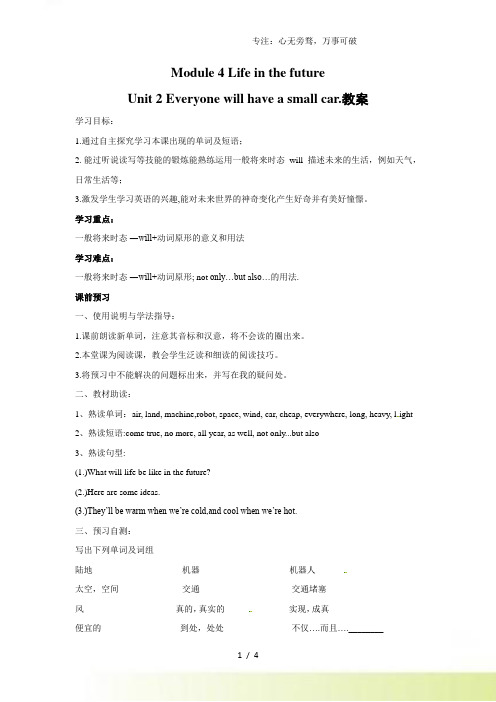
Module 4 Life in the futureUnit 2 Everyone will have a small car.教案学习目标:1.通过自主探究学习本课出现的单词及短语;2. 能过听说读写等技能的锻炼能熟练运用一般将来时态will描述未来的生活,例如天气,日常生活等;3.激发学生学习英语的兴趣,能对未来世界的神奇变化产生好奇并有美好憧憬。
学习重点:一般将来时态―will+动词原形的意义和用法学习难点:一般将来时态―will+动词原形; not only…but a lso…的用法.课前预习一、使用说明与学法指导:1.课前朗读新单词,注意其音标和汉意,将不会读的圈出来。
2.本堂课为阅读课,教会学生泛读和细读的阅读技巧。
3.将预习中不能解决的问题标出来,并写在我的疑问处。
二、教材助读:1、熟读单词:air, land, machine,robot, space, wind, car, cheap, everywhere, long, heavy, l ight2、熟读短语:come true, no more, all year, as well, not only...but also3、熟读句型:(1.)What will life be like in the future?(2.)Here are some ideas.(3.)They’ll be warm when we’re cold,and cool when we’re hot.三、预习自测:写出下列单词及词组陆地_____________ 机器 _____________ 机器人 _____________太空,空间 ________ 交通___________ 交通堵塞 _____________风 _____________ 真的,真实的 ______ 实现,成真 _____________ 便宜的 _____________ 到处,处处_____________ 不仅….而且….________繁重的,沉的_________ 轻的,轻松的__________ 工作的_________短的,短暂的_________ 升起,上升___________Keys:land machine robot space traffic traffic jam wind true come true cheap everywhere not only...but also heavy light job short raise四、我的疑惑:____________________________________________________课内探究一、情景导入:free talk. Look at the pictures on PPT and talk about them.二、学始于疑:ask students to talk about the life i n the future三、质疑探究1.Feedback on the preview讨论解决预习中存在的问题(师生互问探讨)。
外研版英语七年级下Module4Unit2教案1

七年级(下)Module 4 Life In the FutureUnit 2 Everyone will have a small car一、教学内容分析本模块以未来的教室及学习为切入点,谈论将来我们生活的各个方面,学生较为有兴趣,便于展开活动。
Unit2的主要内容是一篇有关于描述未来生活的阅读文章及相关习题。
二、学生情况分析本模块以学生心目中的未来为话题,这与学生的现实生活密切相关,,而涉及的语法项目是一般将来时will 加Be动词加形容词的用法以及有关于将来时的肯定否定句式。
三、教学目标1.以谈论将来生活为中心,介绍并询问有关将来生活的信息.2. 能运用一般将来时中出现形容词的句式。
四、教学重点和难点1.词汇的正确运用。
2.一般将来时will 的陈述句,否定句,一般疑问句及回答五、教学策略任务型教学、自主学习、合作学习六、教学手段TAPE七、教学过程competitionShow their homework. A poster about their home .choose the best one and put it on the wall. (分享学生的海报,并评出最佳海报,让学生更积极地参与活动)Step2. Presentation(1) Teach new words with pictures.(2) Read through the new words and have the students follow and then repeat .(3) Ask and answer: What can you see in the pictures? I can see…and answer the questions(1)Read quickly and match the pictures and headings.(2)Read carefully and find the adjectives and its opposite meanings.(3)Read one by one paragraph to finish the relative exercises and check the answers.(在处理阅读课的时候,先使用略读,再使用跳读,再使用精读,培养了学生阅读的技巧。
外研版七下M4 Unit 2教案
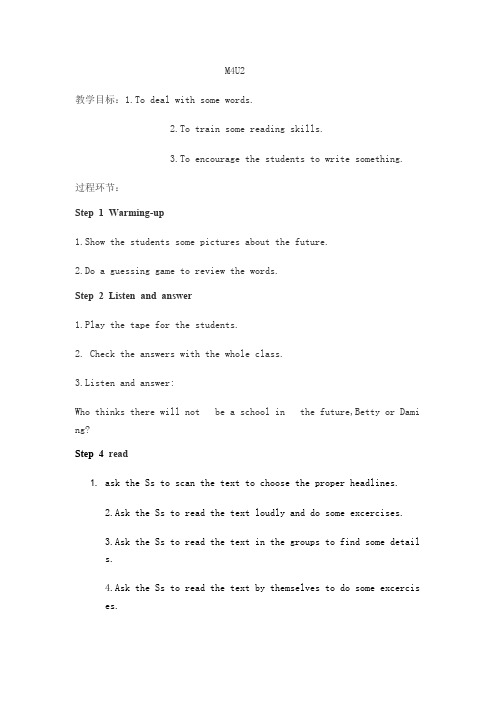
M4U2教学目标:1.To deal with some words.2.To train some reading skills.3.To encourage the students to write something.过程环节:Step 1 Warming-up1.Show the students some pictures about the future.2.Do a guessing game to review the words.Step 2 Listen and answer1.Play the tape for the students.2. Check the answers with the whole class.3.Listen and answer:Who thinks there will not be a school in the future,Betty or Dami ng?Step 4 read1. ask the Ss to scan the text to choose the proper headlines.2.Ask the Ss to read the text loudly and do some excercises.3.Ask the Ss to read the text in the groups to find some details.4.Ask the Ss to read the text by themselves to do some excercises.5.Ask the Ss to read the text by listening to the tape to correct their pronunciation,and make them to develop their ideas to describe the future in their mind.Step 5 Complete the conversation.1. Ask the students to read the words in the box in Activity 4.2. Read through the conversation.3. Complete the conversation with the correct form of the words from the box.Step 6 Talk and choose1.Talk about what your school will be like in 10 years.2.Review what we have learned today with your teacher.3.Choose the right answer.Step 7 Do exercises:Step 10 HomeworkRemember the words of Unit 1 and prepare the text of Unit 2.。
2023年外研版七年级英语下册Module 4 Unit 2教学案

Module 4 Life in the futureUnit 2 Everyone will have a small car教学案一、学习目标:1.会读、会写本课的新词汇和短语;能基本理解并朗读本单元的短文。
2.能读懂叙述未来的短文,掌握整体理解的技能,理解余片的主旨和细节。
3.能用“will”表达自己对未来的预测和想象;能用“so”表达较为复杂的概念。
二、学习重点:本单元涉及的知识点。
三、学习难点:Will表示将来的特殊疑问句;there be句型将来时的表达。
课前预习一、使用说明与学法指导:1. 巩固掌握本单元重点单词、短语及句型。
2. 将预习中不能解决的问题标出来,并写在我的疑问处。
二、教材助读:1、熟读单词:air, land, machine,robot, space, wind, car, cheap, everywhere, long, heavy, light2、熟读短语:come true, no more, all year, as well, not only...but also3、熟读句型:(1.)What will life be like in the future?(2.)Here are some ideas.(3.)They’ll be warm when we’re cold,and cool when we’re hot.三、预习自测:单词拼写(1)Is the story about Tom __________(真实的)?(2)I think I will have a __________(机器人)at my hom e in the future.(3)Don’t litter __________(到处) when you visit a park.(4)The sun _______(升起) in the east every day.(5)There are twenty-four __________(小时) in a day.Keys:(1)true (2)robot (3)everywhere (4)rises (5)hours四、我的疑惑:______________________________________________________课内探究知识点导学1)What will life be like in the future? 未来的生活会怎么样?2)Which ones will come true? 其中那些会变成现实呢?例如:He hopes his dreams come true. 他希望他的梦想成真。
外研版英语七年级下册M4U2教案

新知呈现
1.通过学生的描述及问答复习Unit 1所学句型
2.Answer the quesitons
PPT第3-4页
3.通过小组讨论等形式使学生对老师所提问题进行充分的了解和练习
PPT第3-4页
【设计意图】以问答形式鼓励学生去发现,并帮助他们感知、整理单词和句型现在进行时表将来和一般将来时的不同表达,达到形象记忆的目的。
2.鼓励学生通过Complete the passage with the correctform...Match the words with their opposites. 培养学生的阅读能力与理解能力。
PPT第6-7页
【设计意图】适机的归纳,帮助学生整理,建立新旧知识的学习框架,通过各种方式加强学生的阅读理解能力,为学生创设一个相对自主的平台,鼓励学生把所学知识进行综合运用。
M4U2A2录音
互动教学系统
画图
3.用Check(√) the true sentences.使学生对passage加深印象。
PPT第5页
【设计意图】先看图,再带着问题听课文学习录音,有益于学生展开积极的联想,快速理解课文内容。有层次的游戏设计帮助学生理解课文,强化重难点知识的操练。
(四)
拓展运用
1.归纳整理句型:What will life be like...? The weather will be quite warm... We won’t travel...
三、教学难点
一般将来时的应用。
四、教学资源
互动教学系统,点读笔,PPT
五、教学过程
说明:教学活动具体描述包括教学任务的描述,教师的关键语言,板书呈现,教学资源的使用等。
教学环节
外研版英语七年级下Module4 Unit2教案

Unit 2 Every one will have a small carTeaching aims:1. To learn to use the new words and expressions.2. To learn to use the will structure.3. To get necessary information from the reading material.Teaching points:Key vocabulary—plane, car, robot, holiday, weather, sea, sun, cheap, expensive,heavy, difficultKey structure—will doTeaching procedures:Step 1. RevisionTalk about what we are going to do this Sunday. Get the students to put sentences into anew one using will do.Step 2. Warming-upGet a student to read his passage about his plan for this Sunday, ask and answer questionsabout it.Step 3. PresentationGet the students to look at the pictures in Activity 1, talk about them and say,What can we see on the picture?Step 4. ListeningListen to the tape while looking at the book. Then match each picture to one paragraph.Read the passage again; match the picture and paragraphs with the heading in Activity 3.Step 5. Let’s talkGet the students to talk about each heading, try to find other things to match to it.Such as:Weather: quite warm even hot heavy rain wind sea level riseClothes: warm cold cool hotJobs: machines robots heavy difficult jobs light and easy work long holidays Travel: plane cheap space traffic jamsStep 6. PracticeComplete the passage with the correct form of the words from the box in 5.air cheap everywhere into rise trueWill travel in the future be expensive? No, it’ll be (1) _______. We’ll travel (2)_______ by plane. We’ll be able to (3)_______ over the traffic jams on the land, and we’ll be able to go (4)_______ space. But maybe there’ll be traffic jams in the (5)_______ too. What do you think? Do you think this idea about life in the future will come (6)_______?Answers:Check the answers.cheap everywhere rise into air trueStep 7. PracticeThe teacher says easy; get the students to say hard or difficult. Say big; get the students tosay small.Get the students to match the words in Box 1 with words which mean the opposite in Box2. (Activity 6)Check the answers.Answers:easy --------- difficultexpensive ---------cheaphot ---------coldlarge ---------smalllight ---------heavylong ---------shortwarm ---------coolStep 8. PracticeSay, I buy a cheap coat, but it’s small. Put it as an example.Guide the students to say a sentence like this:I buy an expensive coat, but it’s large.Get the students to make up new sentences, practice in groups. Then share the answers inclass.Step9. Oral workSay, let’s think what we will have in the future.Talk about it in groups, share the answers in class.Choose one or two students to give a report in class.Help the students to give out the right answers.Step 10. Do exercisesFinish off the exercises in Activity 8.Answers:1 Every family will have a plane so it will be cheap to travel everywhere.2 The weather will get hot so the sea level will rise as well.3 Machines and robots will do the heavy and difficult jobs so we’ll only do light andeasy work.Step 11. Homework1. Finish off the Workbook exercise.2. Copy the new words in this unit.。
外研版英语七下M4U2阅读课教案

外研版英语七下M4U2阅读课教案Module 4Unit2 Every family will have a small plane.寿光世纪教育集团东城学校杨倩【课前朗读】air land machine rain robot sea space traffic jam wind come true bicycle cheap everywhere not only….but also… into long heavy light easyworking hour short rise as well【学习目标】知识目标:1.掌握本单元的单词和短语,能够从阅读材料中提取关于未来生活的信息,培养学生的阅读技能。
2.能用“will”表达自己对未来的预测和想象。
过程与方法:掌握理解文章大意的阅读策略开门见山法,能向同学们描述自己对未来的设想。
能在小组合作中积极与他人合作。
情感目标:通过对美好未来的憧憬,培养乐观向上的精神。
【学习重难点】含有“will”的一般将来时的肯定、否定及疑问句结构。
【学习过程】Step 1 Leading-inFree talkWork in pairs and discuss “What will your life in the future be like? ”You can use the following questions to help you.1.Where will you work?2.Will you be rich or poor?3.Will you have an expensive car?4.Will you have a laptop?5.How many children will you have?6.Will you be handsome/pretty?7.Where will you live? Work in pairs. Look at the pictures and describe what you see. Use the words and expression from the box to help you.●教师先让学生大胆想象一下未来的生活会是什么样子,然后提问一两名学生。
七年级英语Module4 Unit2教案 外研社 教案
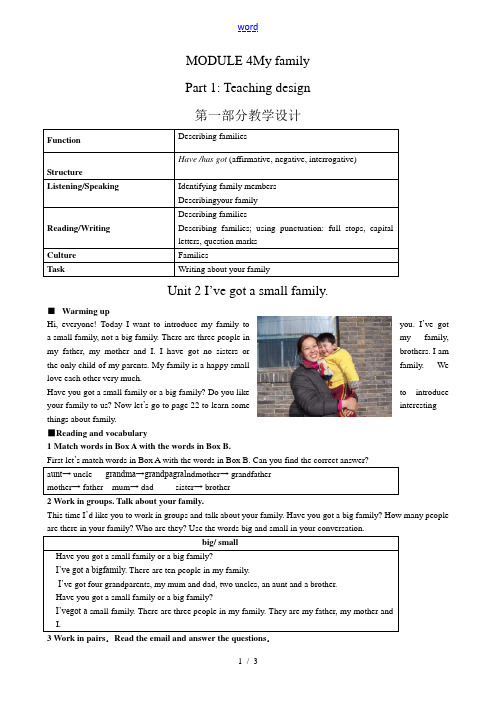
MODULE 4My familyPart 1: Teaching design第一部分教学设计Function Describing familiesStructureHave /has got (affirmative, negative, interrogative)Listening/Speaking Identifying family membersDescribingyour familyReading/Writing Describing familiesDescribing families; using punctuation: full stops, capital letters, question marksCulture FamiliesTask Writing about your familyUnit 2 I’ve got a small family.■Warming upHi, everyone! Today I want to introduce my family to you. I’ve got a small family, not a big family. There are three people in my family, my father, my mother and I. I have got no sisters or brothers. I am the only child of my parents. My family is a happy small family. We love each other very much.Have you got a small family or a big family? Do you like to introduce your family to us? Now let’s go to page 22 to learn some interesting things about family.■Reading and vocabulary1 Match words in Box A with the words in Box B.First let’s match words in Box A with the words in Box B. Can you find the correct answer?a unt→ uncle grandma→grandpagral ndmother→ grandfathermother→ father mum→ dad sister→ brother2 Work in groups. Talk about your family.This time I’d like you to work in groups and talk about your family. Have you got a big family? How many people are there in your family? Who are they? Use the words big and small in your conversation.big/ small---Have you got a small family or a big family?---I’ve got a bigfamily. There are ten people in my family.I’ve got four grandparents, my mum and dad, two uncles, an aunt and a brother.---Have you got a small family or a big family?---I’vegot a small family. There are three people in my family. They are my father, my mother andI.3 Work in pairs.Read the email and answer the questions.On page 23, we can see an email from Lingling to Diana. What can you learn from this email? After you read theLet’s read the email. While reading try to cut (断句)/ the sentences into parts, blacken(涂黑)the predicates,Read the email once again. This time pay attention to its meaning. Try to understand the passage yourself.■Writing4 Look at this passage. Underline the capital letters,full stops and question marks.In our writing, it is important to know the use of capital letters, full stops, question marks and other punctuations.5 Put capital letters, full stops, and question marks into this passage.Do you know when to use the capital letters? Do you know the difference between full stops and question marks? Please put these things into the passage below.。
AteachingplanforUnit2,Module4(外研版七年级英语下册教案教学设计)
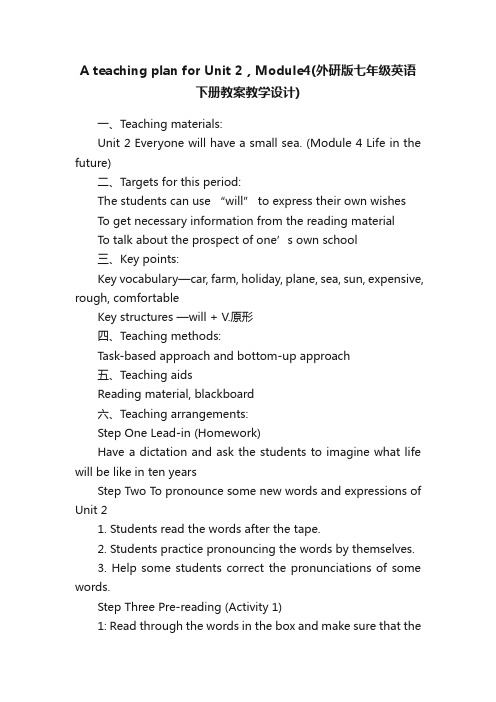
A teaching plan for Unit 2,Module4(外研版七年级英语下册教案教学设计)一、Teaching materials:Unit 2 Everyone will have a small sea. (Module 4 Life in the future)二、Targets for this period:The students can use “will” to express their own wishesTo get necessary information from the reading materialTo talk about the prospect of one’s own school三、Key points:Key vocabulary—car, farm, holiday, plane, sea, sun, expensive, rough, comfortableKey structures —will + V.原形四、Teaching methods:Task-based approach and bottom-up approach五、Teaching aidsReading material, blackboard六、Teaching arrangements:Step One Lead-in (Homework)Have a dictation and ask the students to imagine what life will be like in ten yearsStep Two To pronounce some new words and expressions of Unit 21. Students read the words after the tape.2. Students practice pronouncing the words by themselves.3. Help some students correct the pronunciations of some words.Step Three Pre-reading (Activity 1)1: Read through the words in the box and make sure that thestudents understand them all.2. Ask the students to look at the pictures and tell their partners what they can see in the each one.3. Collect their answers in a whole-class setting as complete sentences.4. Learning to learn: Before the students read the passage, have them read through the Learning to learn box.5. Talk about the importance of inferring the meaning from context, and the fact that it is not necessary to understand every word in order to understand the general meaning of a text.Step Four Fast reading (Activity 1&2)1. Ask the students to read through the passage individually, and then match the paragraphs with the pictures.2. They should check with a partner.3. Collect the answers in a whole-class setting; ask a student to read a paragraph and then say which picture it goes with.Step Five To match the pictures and paragraphs with the headings (Activity 3)1. Read through the words and have the students repeat them.2. Work on the syllable stress of the multi-syllable words.Cli/mate Homes Jobs Tech/nol/o/gy Tran/sport3. Make sure they understand what the words mean.4. Ask the students to match the paragraphs and pictures individually, then check with a partner.5. Collect the answers from the class.Cli/mate: Paragraph B-Picture 2 Homes: Paragraph C-Picture 5Jobs: Paragraph E-Picture 3 Tech/nol/o/gy: Paragraph D-Picture 1Tran/sport: Paragraph A-Picture 4Step Six Careful reading(Activity 3)Ask the students to read through the sentences and decide which are true in the passage.Step Seven Detail explanation1. get1) get + adj. e.g. The food is getting cold.2) get sb. sth. = get sth. for sb.3) get to a place get up get on/off2. heat1) (v.) We’ll heat some milk for the coffee2) (n.) I can’t walk in this heat.3. three days a week once a year three times two weeksStep Eight Students practice reading the passage aloud1. Read through the words and have the students repeat them chorally and individually. (Activity 4)2. Make sure they understand the meaning of all of them.3. Ask the students to match the words individually, then check with a partnercheap-expensive comfortable-uncomfortable easy-difficult good-bad hot-cold interesting-dull large-small light-heavy new-old rough-smooth short-long strong-weak warm-cool Step Nine T o answer the questions (Activity 5)1. Read through the words and have the students repeat them after you.2. Ask them to find answers individually then check with a partner.Step Ten Writing (Activity 8)Read the example sentences, and help them to see that “so” relate the cause to the effect to become a single sentence withtwo clauses.e.g. Planes will be very large. Flying will be very cheap.----Planes will be very large so flying will be very cheap.1. It will probably be hot all year so the winter will be very short.2. We’ll use the sun to heat our homes so no one will be cold and there’ll be lots of hot water.3. People will work three days a week so they’ll have long holidays and lots of free time.Homework:1. To talk about life in the future in pairs2. To finish Unit2, Module4, 点中典Blackboard designingUnit 2 Everyone will have a small sea.Headlines: notes-picturesCli/mate: Paragraph B-Picture 2 Homes: Paragraph C-Picture 5Jobs: Paragraph E-Picture 3 Tech/nol/o/gy: Paragraph D-Picture 1Tran/sport: Paragraph A-Picture 4The opposite adjective:hot-cold interesting-dull large-small light-heavy展开全文阅读new-old rough-smooth short-long strong-weak warm-coolcheap-expensive comfortable-uncomfortable easy-difficult good-badso-clausee.g. Planes will be very large. Flying will be very cheap.----Planes will be very large so flying will be very cheap.1. It will probably be hot all year so the winter will be veryshort.2. We’ll use the sun to heat our homes so no one will be cold and there’ll be lots of hot water.3. People will work three days a week so they’ll have long holidays and lots of free time.。
2024年初中英语外研版m4u2教案
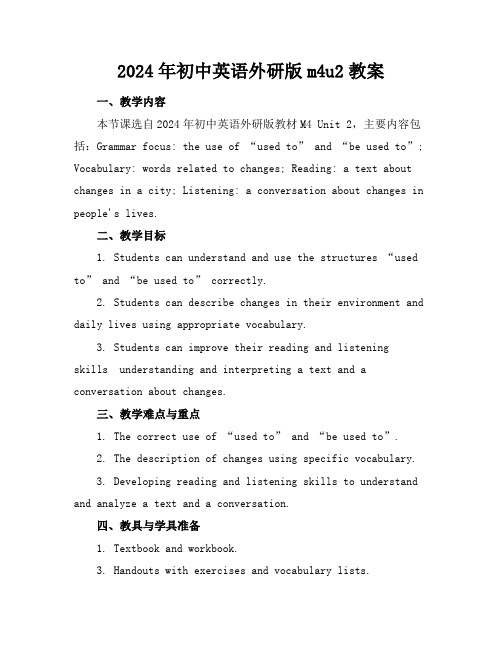
2024年初中英语外研版m4u2教案一、教学内容本节课选自2024年初中英语外研版教材M4 Unit 2,主要内容包括:Grammar focus: the use of “used to” and “be used to”; Vocabulary: words related to changes; Reading: a text about changes in a city; Listening: a conversation about changes in people's lives.二、教学目标1. Students can understand and use the structures “used to” and “be used to” correctly.2. Students can describe changes in their environment and daily lives using appropriate vocabulary.3. Students can improve their reading and listeningskills understanding and interpreting a text and a conversation about changes.三、教学难点与重点1. The correct use of “used to” and “be used to”.2. The description of changes using specific vocabulary.3. Developing reading and listening skills to understand and analyze a text and a conversation.四、教具与学具准备1. Textbook and workbook.3. Handouts with exercises and vocabulary lists.4. Answer keys for selfchecking.五、教学过程1. Introduction (5 minutes)Set a practical context showing pictures of a city before and after changes.Elicit students' ideas about the changes and encourage them to express their opinions.2. Vocabulary presentation (10 minutes)Introduce new vocabulary related to changes, using pictures and examples.Conduct activities to practice the new words, such as matching and group discussions.3. Grammar focus (15 minutes)Explain the use of “used to” and “be used to” with examples.Provide practice exercises for students to use the structures in sentences.4. Reading and listening (15 minutes)Play the listening conversation, and students answer related questions.5. Group work (10 minutes)Divide students into groups and assign tasks to describe changes using the learned vocabulary and grammar structures.6. Guided practice (5 minutes)Provide guided exercises for students to practice reading and listening skills.Offer feedback and corrections to ensure understanding.7. Production (10 minutes)Ask students to create a short dialogue or story about changes in their own lives using the learned vocabulary and grammar.Share and discuss the productions among classmates.六、板书设计1. Write the key vocabulary and grammar structures on the board.2. Use a mindmap to visually represent the changes in the city.3. Include example sentences and exercises for students to refer to during practice.七、作业设计八、课后反思及拓展延伸1. Reflect on the effectiveness of the practical context, vocabulary presentation, and group work activities.2. Consider adjustments for future lessons to enhance student engagement and understanding.3. Extend learning exploring additional resources, such as online videos or articles about changes in different cities or cultures.重点和难点解析1. 教学难点与重点的明确;2. “used to”和“be used to”的正确使用;3. 词汇的呈现与实践;4. 阅读和听力的教学过程;5. 课堂活动的组织与反馈;6. 作业设计与答案提供;7. 课后反思与拓展延伸。
外研社版初中英语七年级下册Module 4 Unit 2 教案
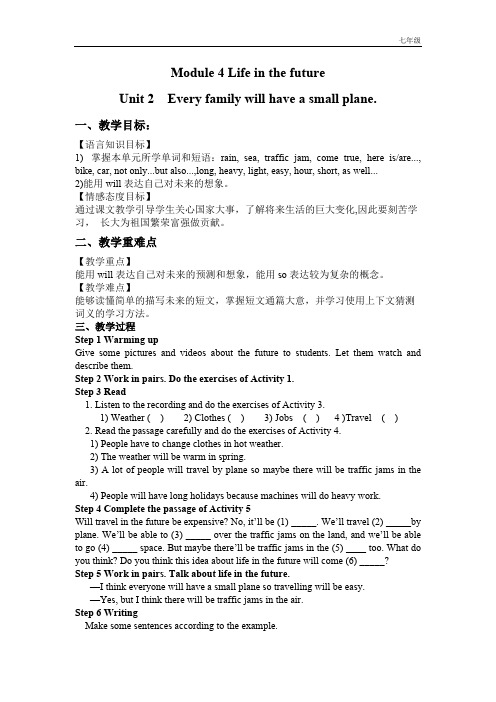
Module 4 Life in the futureUnit 2 Every family will have a small plane.一、教学目标:【语言知识目标】1) 掌握本单元所学单词和短语:rain, sea, traffic jam, come true, here is/are..., bike, car, not only...but also...,long, heavy, light, easy, hour, short, as well...2)能用will表达自己对未来的想象。
【情感态度目标】通过课文教学引导学生关心国家大事,了解将来生活的巨大变化,因此要刻苦学习,长大为祖国繁荣富强做贡献。
二、教学重难点【教学重点】能用will表达自己对未来的预测和想象,能用so表达较为复杂的概念。
【教学难点】能够读懂简单的描写未来的短文,掌握短文通篇大意,并学习使用上下文猜测词义的学习方法。
三、教学过程Step 1 Warming upGive some pictures and videos about the future to students. Let them watch and describe them.Step 2 Work in pairs. Do the exercises of Activity 1.Step 3 Read1. Listen to the recording and do the exercises of Activity 3.1) Weather ( ) 2) Clothes ( ) 3) Jobs ( ) 4 )Travel ( )2. Read the passage carefully and do the exercises of Activity 4.1) People have to change clothes in hot weather.2) The weather will be warm in spring.3) A lot of people will travel by plane so maybe there will be traffic jams in the air.4) People will have long holidays because machines will do heavy work.Step 4 Complete the passage of Activity 5Will travel in the future be expensive? No, it’ll be (1) _____. We’ll travel (2) _____by plane. We’ll be able to (3) _____ over the traffic jams on the land, and we’ll be able to go (4) _____ space. But maybe there’ll be traffic jams in the (5) ____ too. What do you think? Do you think this idea about life in the future will come (6) _____?Step 5 Work in pairs. Talk about life in the future.—I think everyone will have a small plane so travelling will be easy.—Yes, but I think there will be traffic jams in the air.Step 6 WritingMake some sentences according to the example.Working hours will be short. People will have long holidays.Working hours will be short so people will have long holidays.1. Every family will have a plane so...____________________________________2. The weather will get hot so...___________________________________3. Machines and robots will do the heavy and difficult jobs so..._____________________________________Step 7 Language Points1. here is/are...下面,用于介绍某人或某物。
外研版七年级英语下Module4 Unit2教案(英语教案)

知识目标:
1.掌握本单元重点词汇:
land,machine,rain,robot,space,wind,cheap,
everywhere, heavy, traffic jam, come true, as well
2.学习、理解和掌握“will+动词原形”表示一般将来时的用法。
能力目标:
traffic jam, come true, as well
2.理解和掌握“will+动词原形”表示一般将来时的用法,并能运用所学与他人谈论未来的生活。
挑选一名学生读并翻译本课学习目标,让学生明确本节课要掌握的内容。
Step 3:Words and expression
利用图片学习本节重点词汇,再给学生2分钟时间识记,之后每组派一名同学上台板演,其余学生在纸上听写。参与板演的同学可根据听写情况为小组赢得相应分数,板书较好的同学可以额外加分。其余同学互相检查背诵情况,也可以得到相应分数。
1.here is /are…的用法
2.not only…but also连接的两个成分作主语时,谓语动词要与其最近的主语在人称和数方面保持一致。
3.讲解as well的用法
4.询问天气的表达方式:
What’s the weather like today? = How is the weather today?
Check the true sentences.
让学生大声朗读课文,并完成活动四的任务。然后组内核对答案,并在文章中找出正确的句子。各组派一名代表,举手回答。(回答正确加1分)
通过任务型阅读的方式,让学生详细阅读课文,获取细节性信息
Step8:Language points
初中英语外研版m4u2教案
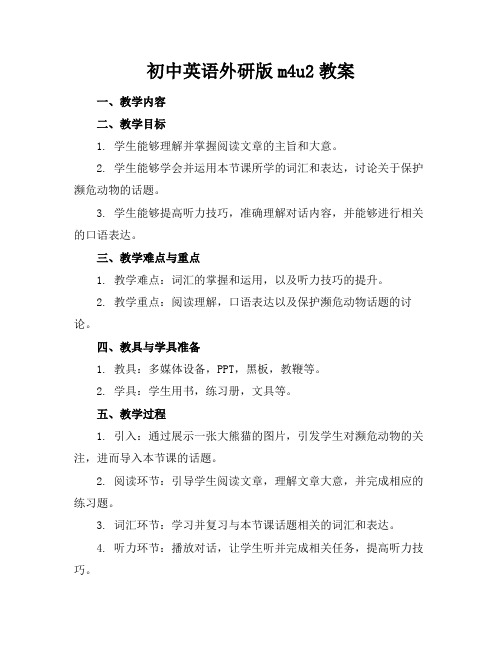
初中英语外研版m4u2教案一、教学内容二、教学目标1. 学生能够理解并掌握阅读文章的主旨和大意。
2. 学生能够学会并运用本节课所学的词汇和表达,讨论关于保护濒危动物的话题。
3. 学生能够提高听力技巧,准确理解对话内容,并能够进行相关的口语表达。
三、教学难点与重点1. 教学难点:词汇的掌握和运用,以及听力技巧的提升。
2. 教学重点:阅读理解,口语表达以及保护濒危动物话题的讨论。
四、教具与学具准备1. 教具:多媒体设备,PPT,黑板,教鞭等。
2. 学具:学生用书,练习册,文具等。
五、教学过程1. 引入:通过展示一张大熊猫的图片,引发学生对濒危动物的关注,进而导入本节课的话题。
2. 阅读环节:引导学生阅读文章,理解文章大意,并完成相应的练习题。
3. 词汇环节:学习并复习与本节课话题相关的词汇和表达。
4. 听力环节:播放对话,让学生听并完成相关任务,提高听力技巧。
5. 口语环节:分组讨论,让学生运用所学词汇和表达,讨论如何保护濒危动物。
六、板书设计1. M4 Unit 2 The story of Xi Wang2. 主要内容:文章大意,重点词汇,听力技巧,口语表达等。
七、作业设计1. 作业题目:Write a short passage about how to protect endangered animals.2. 答案示例:We should take action to protect endangered animals. Firstly, we need to create a good living environment for them. Secondly, it's important to establish laws to protect these animals. Lastly, we should raise public awareness about the importance of biodiversity.八、课后反思及拓展延伸1. 课后反思:本节课学生对词汇的掌握和运用较好,但在听力环节部分学生存在一定的困难,今后需加强对这部分学生的指导。
初中英语外研版七年级下册module4《Unit2 Every family will have a small plane》优质课教案公开课教案
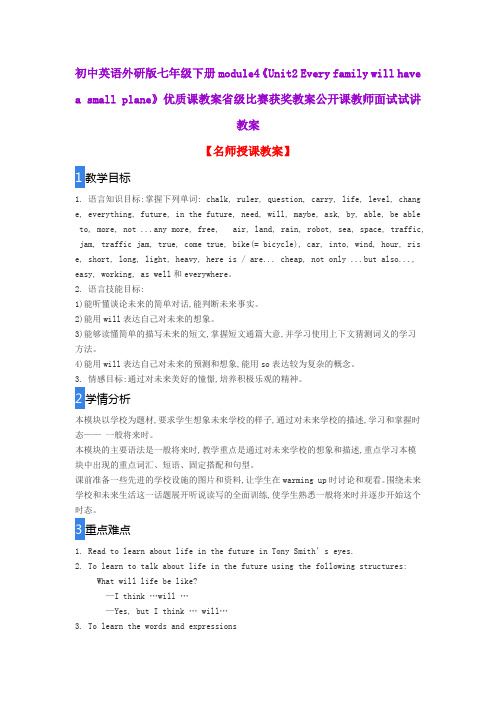
初中英语外研版七年级下册module4《Unit2 Every family will have a small plane》优质课教案省级比赛获奖教案公开课教师面试试讲教案【名师授课教案】1教学目标1. 语言知识目标:掌握下列单词: chalk, ruler, question, carry, life, level, chang e, everything, future, in the future, need, will, maybe, ask, by, able, be able to, more, not ...any more, free, air, land, rain, robot, sea, space, traffic, jam, traffic jam, true, come true, bike(= bicycle), car, into, wind, hour, ris e, short, long, light, heavy, here is / are... cheap, not only ...but also..., easy, working, as well和everywhere。
2. 语言技能目标:1)能听懂谈论未来的简单对话,能判断未来事实。
2)能用will表达自己对未来的想象。
3)能够读懂简单的描写未来的短文,掌握短文通篇大意,并学习使用上下文猜测词义的学习方法。
4)能用will表达自己对未来的预测和想象,能用so表达较为复杂的概念。
3. 情感目标:通过对未来美好的憧憬,培养积极乐观的精神。
2学情分析本模块以学校为题材,要求学生想象未来学校的样子,通过对未来学校的描述,学习和掌握时态——一般将来时。
本模块的主要语法是一般将来时,教学重点是通过对未来学校的想象和描述,重点学习本模块中出现的重点词汇、短语、固定搭配和句型。
课前准备一些先进的学校设施的图片和资料,让学生在warming up时讨论和观看。
七年级英语下册 Module 4 Unit 2 Life in the future
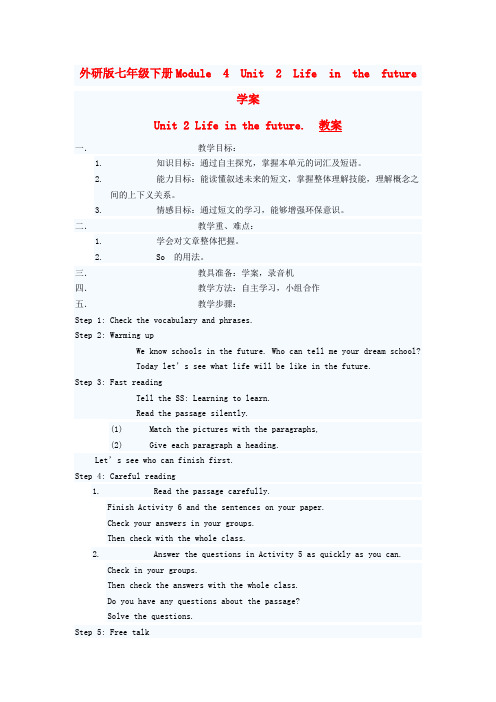
外研版七年级下册Module 4 Unit 2 Life in the future学案Unit 2 Life in the future. 教案一.教学目标:1. 知识目标:通过自主探究,掌握本单元的词汇及短语。
2. 能力目标:能读懂叙述未来的短文,掌握整体理解技能,理解概念之间的上下义关系。
3. 情感目标:通过短文的学习,能够增强环保意识。
二.教学重、难点:1. 学会对文章整体把握。
2. So 的用法。
三.教具准备:学案,录音机四.教学方法:自主学习,小组合作五.教学步骤:Step 1: Check the vocabulary and phrases.Step 2: Warming upWe know schools in the future. Who can tell me your dream school?Today let’s see what life will be like in the future.Step 3: Fast readingTell the SS: Learning to learn.Read the passage silently.(1) Match the pictures with the paragraphs,(2) Give each paragraph a heading.Let’s see who can finish first.Step 4: Careful reading1. Read the passage carefully.Finish Activity 6 and the sentences on your paper.Check your answers in your groups.Then check with the whole class.2. Answer the questions in Activity 5 as quickly as you can.Check in your groups.Then check the answers with the whole class.Do you have any questions about the passage?Solve the questions.Step 5: Free talkWork in groups .Each group choose one topic.(1) Climate (2) Homes (3) Jobs (4) Technology (5) TransportConclusion: Our lives will be better and better in the future. But the climate will be worse and worse.What will you do to protect the environment?Step 6: Do some exercises. (见学案)Step 7: Homework1. Do exercises on workbook P118:12.2. Finish off the workbook exercises.Unit 2 Life in the future. 学案一.学习目标:1. 知识目标:通过自主探究,掌握本单元的词汇及短语。
—七年级下册英语(外研版)教案:Module4Unit2教案

Module 4 Life in the futureUnit 2 Everyone will have a small plane.Teaching aims:To get necessary information from the reading materialKey points:Key words: car, farm, holiday, plane, sea, sun, expensive, rough, comfortableKey structures: will + V.原形Teaching procedures:Step 1: Warming-upGet the students to talk about the schools in the future.Step 2: Presentation:1. show the question: What will our life be like in the future? Then tell the students that today we will talk about the life in the future from five aspects.2. Teach the five aspects: climate, homes, jobs, technology, transport3. Show the five pictures to the students, tell them that each picture refers to one aspect. Have the student match the pictures with the aspects.4. Talk about the five picture.5. Teach the new words of this unit.Step 3: Reading1. Read the passage and match the pictures and paragraphs with the headings.2. Play the tape, show the two boxes in Activity 4 and have the students match the words in Box 1 with the words in Box2.3. Show seven statements to the students and have the students read the passage again, then check the sentences.Step4: DrillRetell the passageStep 5 DiscussionWork in pairs and discuss the questions in Activity 7.HomeworkExercise books unit2。
- 1、下载文档前请自行甄别文档内容的完整性,平台不提供额外的编辑、内容补充、找答案等附加服务。
- 2、"仅部分预览"的文档,不可在线预览部分如存在完整性等问题,可反馈申请退款(可完整预览的文档不适用该条件!)。
- 3、如文档侵犯您的权益,请联系客服反馈,我们会尽快为您处理(人工客服工作时间:9:00-18:30)。
Module 4Unit2 Every family will have a small plane.寿光世纪教育集团东城学校杨倩【课前朗读】air land machine rain robot sea space traffic jam wind come true bicycle cheap everywhere not only….but also… into long heavy light easyworking hour short rise as well【学习目标】知识目标:1.掌握本单元的单词和短语,能够从阅读材料中提取关于未来生活的信息,培养学生的阅读技能。
2.能用“will”表达自己对未来的预测和想象。
过程与方法:掌握理解文章大意的阅读策略开门见山法,能向同学们描述自己对未来的设想。
能在小组合作中积极与他人合作。
情感目标:通过对美好未来的憧憬,培养乐观向上的精神。
【学习重难点】含有“will”的一般将来时的肯定、否定及疑问句结构。
【学习过程】Step 1 Leading-inFree talkWork in pairs and discuss “What will your life in the future be like? ”You can use the following questions to help you.1.Where will you work?2.Will you be rich or poor?3.Will you have an expensive car?4.Will you have a laptop?5.How many children will you have?6.Will you be handsome/pretty?7.Where will you live? Work in pairs. Look at the pictures and describe what you see. Use the words and expression from the box to help you.●教师先让学生大胆想象一下未来的生活会是什么样子,然后提问一两名学生。
●由前面的操作转入活动1的图片,教师引导学生用方框中的词汇先来描述图Step 2 Reading1、 Fast ReadingWhat is the main idea of the passage?2、 Read the passage quickly and match the pictures inActivity1 with the paragraphs.说明:本活动为信息辨认活动,要求学生根据每一个段落的具体信息,来把段落与图片进行匹配。
学生个体活动,独自阅读,然后进行匹配。
3、Read again and match the paragraphs with theheadings.说明:本活动为信息概括活动,有助于培养学生总结和理解大意的能力。
①②Clothes③Jobs ④Travel4、Read the passagecarefully and check the truesentences.说明:本活动为信息辨认活动,有助于加强学生对课文内容的理解。
①Pe ople have to change clothes in hot weather.① The weather will be warm in spring. ② A lot of people will travel by plane so maybe there will be traffic jams in the air. ③ People will have long holidays because machines will do heavy work. 5、Complete the passage with correct form of the wordsfrom the box.说明:本活动强化了核心词汇,使学生在完成活动的过程中进一步加深对词汇和文章的理解。
(锻炼学生概括文章大意的能力)Will travel in the future be expensive?No, it will be .We will travel by plane. We will be able to over the traffic jams on the land, and we will be able to go space. But maybe there will be traffic jams in the too. What do you think? Do you think this idea about life in the future will come ?Step 3 Practice.利用本节课学到的阅读方法开门见山法读完下面的文章,阅读并从各个小题所给的四个选项中选出能回答所提问题或完成所给句子的一个最佳答案。
Future lifeLife in the future will be different from life today. Between then and now many changes will happen. But what will the changes be?The population(人口) is growing fast. There will be many people in the world and most of them will live longer than people live now.Computers will be much smaller and more useful. And there will be at least one in every home. And computer studies will be one of the important subjects in school then. People will work fewer hours than they do now and they will have more free time for sports, watching TV and travelling. Travelling will be much cheaper and easier. And many more people will go to other countries for holidays.There will be changes in our food, too. More lands will be used for building new towns and houses for all the people. Then there will be less room for cows and sheep, so meat will be more expensive. Maybe no one will eat meat every day. Instead, they will eat more fruit and vegetables. Maybe people will be healthier.Work will be different in the future, too. Robots will do dangerous and hard work. Because of this, people will not have enough work to do. This will be a problem.( ) 1. In the future there will be__________.A.less fruitB. more peopleC. less vegetablesD. lesspeople( ) 2. Every family will have at least a ____ in the family.A.robotB. cowC. TV setD. computer( ) 3. People may not eat _______as much as they do today. A.Fruit B. fish C. meat D. rice( ) 4. Which of the following is not mentioned (提到) in the passage?A. Computer.B. Food.C. Pollution.D. Population. ( ) 5. What is the main idea of this passage?A. The changes of the Population in the future.B. The changes of food in the future.C. The changes of computer in the future.D. The changes of our life in the future.Step 4 Homework.Writing争当预言家!同学们,在未来的日子里,家里会有机器人代替我们工作吗?你心目中的机器人是什么样子呢?它能为人们做哪些工作呢?赶快动手吧,把你心中的机器人画出来,并且向你的同伴们介绍一下他的“威力”!关键词:There will be…., in the future, housework, robot,instead(代替)…..。
